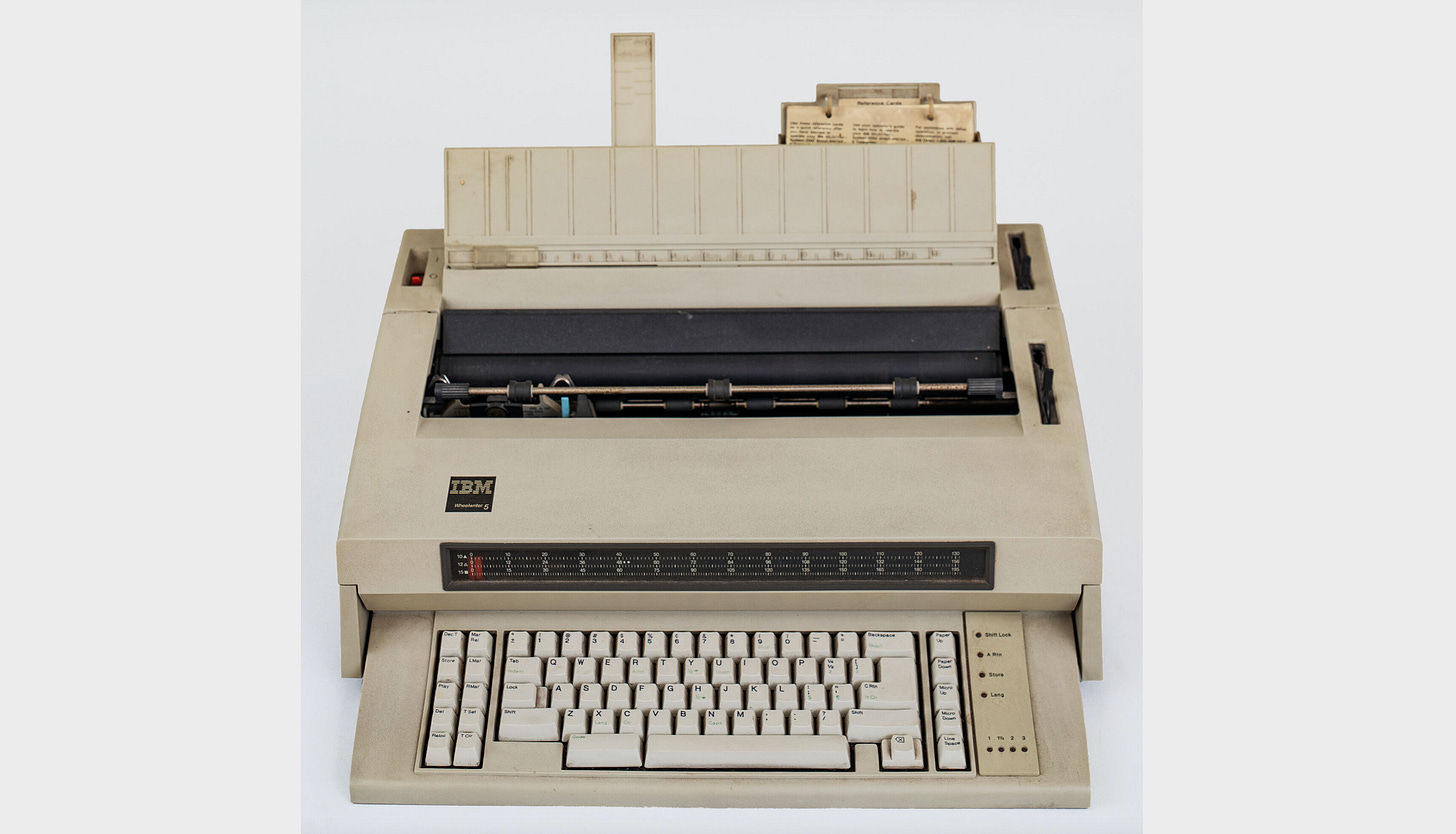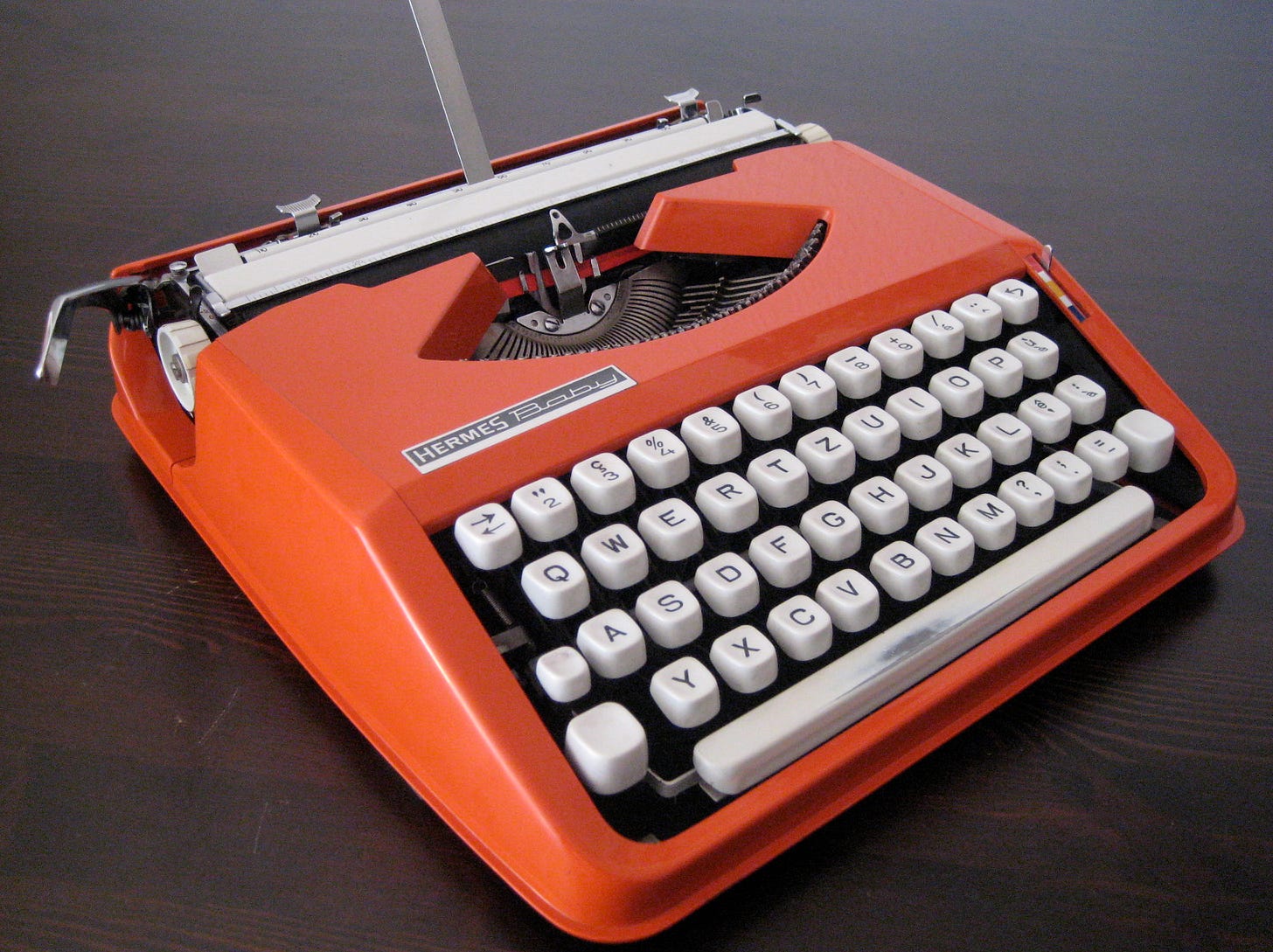"Just type it."
Or, the best way to worship the Muse
(Joan Didion’s last typewriter. She (probably) typed The Year of Magical Thinking on it.)
Once upon a time I had a one-year gig as a clerk for a Federal Court of Appeals Judge. He had three clerks, and our windowless offices were in a row in the back hall of his chambers. We spent our days, mostly, writing drafts of appellate opinions. Once one of my co-clerks had a complicated opinion to write. She was going down a research rat-hole, and she was not feeling confident about how to justify the result the court had reached.
The Judge was an exceptionally calm, steady, and undemonstrative man. But the Chief Judge of the Circuit had laid down a rule that draft opinions must be circulated to all the other members of the Court within some number of days — I think it was sixty days — after the oral argument. Our Judge was not going to miss that deadline.
One day the Judge walked down the hall past my door, and stopped in the doorway of my co-clerk. I heard him ask when he was going to see the draft. She responded with a lot of reasons — to be fair, legitimate ones, she was not slacking off — why she was having trouble finishing the draft. My door was open and I could hear all of this. She finished her explanation and there was a long pause. Then the Judge responded:
“Just type it.”
Then he walked past my door, back to his office. My co-clerk came into my office, sat down, and said “Did you hear that? Just type it!” And she burst out laughing.
So she did it. She just typed it. Then she turned it in. It was fine. Whatever shortcomings the opinion may have had, the world continued to revolve on its axis, as always, and the opinion was published, and it disappeared into the Federal reporter, where it resides, probably mostly forgotten, to this day.
The Judge was right.
Just type it.
(Ernest Hemingway’s typewriter. He just typed A Moveable Feast on it.)
There is lot of discussion on Substack about having trouble writing.
There have been some helpful suggestions about overcoming the chronic malaise known as writer’s block.
I have a few ideas of my own on the matter.
These are my credentials: I have co-authored one book, had a few published stories and poems, and done an enormous volume of professional legal writing. Professionally, I am always writing to a deadline. It has to be done, on time.
I, too, have screamed (internally) at the sight of the blank page.
My thoughts herein are not novel.
But sometimes it is helpful to hear what we already know, to motivate us.
Think of what follows as a pep talk, which may be of some use to some of you.
(Phillip K. Dick just typed The Man in the High Castle on a typewriter like this one.)
Writing is both intellectual and corporeal.
We write with our minds and our bodies.
We tend to over-value the former and under-value the latter.
Writing is the process of sitting or standing at a keyboard and typing words.
Writing is typing.
The body starts working, and the brain follows.
We think it has to be the other way around, but that’s wrong.
Sometimes the body goes first — fingers, posture, location — and the thoughts and images follow.
Truman Capote famously dismissed Jack Kerouac’s On the Road, saying “That's not writing, that's typing.”
Even so, by typing, Kerouac wrote, and finished, and published, a book that is still in print, that people still read and enjoy.
Not bad for just typing it.
(Jack Kerouac just typed On the Road on a clunky old beast like this one.)
The world is a big place, and there is certainly someone, somewhere, who writes substantial works of prose in pen, on paper. A few stubborn souls may even still use mechanical typewriters, like the literary heroes I celebrate in this post.
These days, the rest of us, most of us, use computers.
Placing ourselves in front of the keyboard and compelling ourselves to “just type it” is a crucial discipline.
If you have thought about it for a few minutes, and you are still not sure what you are going to write, then just start typing.
The thinking in your head, that’s going on before you start typing, and even while you are typing, is preliminary to the writing.
The physical action of typing the words, generating the document, the work product, the text, is the writing.
The physical process of typing the words IS the writing.
(Robert E. Howard just typed “The Queen of the Black Coast” and “The Frost Giant’s Daughter” and “The Phoenix of the Sword” on a typewriter just like this one.)
It is a well known and truthful axiom that there is no such thing as a bad first draft.
But getting that first draft is hard.
You must persevere through the mental and physical exertion of just typing that first draft.
Then and only then can you enjoy the comparatively easy and fun part, revising, and cleaning up, and rephrasing more cleverly, and fitting the new mass of hard-won material into the larger body you have already built up.
But you can’t do any of that fun stuff until you have JUST TYPED that first draft.
(Frederick Forsyth just typed The Day of the Jackal on a typewriter much like this one.)
Writing is both intellectual and corporeal, as previously noted.
Writing is also spiritual.
We want inspiration, which means to have the spirit infused into us.
The Greeks spoke of the Muse, a Goddess, who provided that inspiration.
The Muse is real.
The Muse will not sing if we do not solicit her aid, and if we are not diligent in her service.
Even when we seem devoid of ideas, amidst all the anxieties and distractions of life, just type it.
When we do, we give reverence to the Muse, and she will smile on our efforts.








Those smaller electrics. Smith Corolla. those were my favorite. loud as hell. humming. vibrating. CLACKING. Lol. but i do love the laptop. "You write with your whole body" is def true for me.
i have tried
Just typing it
Yesterday and
The day before
But now I have
The real answer
Build a library cart
Fill it full of the books
You hope to consult
and place it
Beside you
And
Just type it